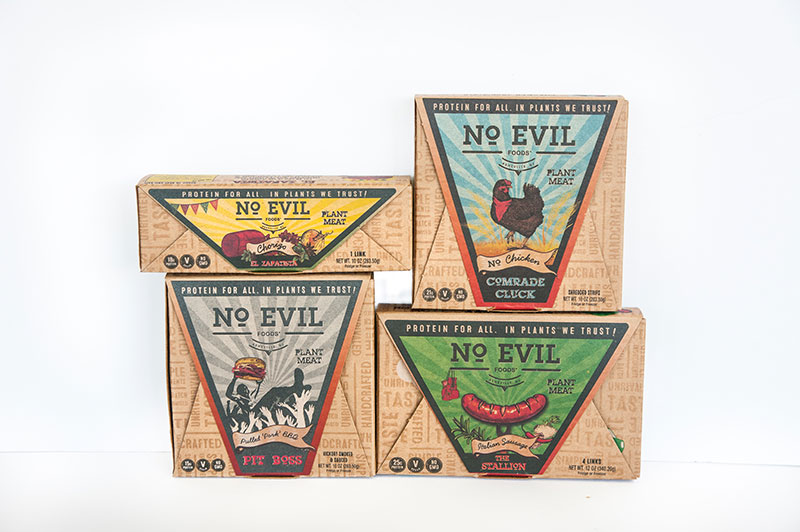No Evil Foods, makers of small-batch plant-based meat, has partnered with rePurpose Global, a movement of conscious consumers and businesses, to offset its plastic footprint.
The Ashville, North Carolina brand has committed to going plastic negative by funding the recovery and recycling of two pounds of plastic waste for every one pound it generates. In doing so, it will become the first plant-based meat company to take a plastic-negative stance.
Every year, eight million metric tons of plastic is added to the estimated 150 tons of plastic waste circulating in the oceans.
“Becoming a plastic negative company through rePurpose Global enables us to be directly actionable in our mission to fuel and inspire positive impacts on people, planet and animals. As a food manufacturer, plastic is a necessity to create safe products, but we can’t ignore our participation in a pressing global plastic-waste problem,” said Sadrah Schadel, co-founder of No Evil Foods. “For No Evil Foods, that means committing to plastic neutrality and choosing to do business responsibly and sustainably by removing twice as much plastic waste generated from our packaging. Until viable alternatives exist, we will continue to seek ways to manage the impact of the creation of our products.”
No Evil Foods’ mission is to make the world a better place for people, animals and the environment. Its partnership with rePurpose Global not only drives positive environmental impacts, but positive social impacts as well.
Through rePurpose Global, CarPe, a civic engagement enterprise, will directly support No Evil Foods’ commitment by serving as its impact partner. CarPe is focused on waste management and has significant expertise in building new value chains for plastic waste recovery and recycling across central and northern India. CarPe will act as the on-the-ground support to recover twice the amount of low value plastic than the company’s plastic footprint. In the first year of the partnership, it is estimated that CarPe will remove about 8,000 pounds of plastic from the ecosystem – two times the amount of plastic used to produce No Evil Foods’ products.
“Our partnership with rePurpose has a positive environmental as well as a social impact. By offsetting our plastic waste through CarPe, we are also supporting a project that is dedicated to doing no harm to marginalized communities while striving to improve their conditions,” said Schadel.
Sustainability has long been a priority for No Evil Foods. Each of its plant meat varieties is wrapped in an unbleached kraft carton for a packaging material that is fully home compostable. Made from 100 percent compostable and recyclable materials, its packaging utilizes plant-based ink and water-soluble adhesives.
“Sustainable packaging is a huge part of the No Evil Foods brand and, in the future, we hope to eliminate our need for plastics in our packaging altogether. Until then, we feel that making a plastic neutral or plastic negative commitment through organizations like rePurpose Global is the next best step a company can take,” Schadel said.
Driven by the mindset of doing good for the planet and the people on the planet, so far in 2020 the brand has donated more than 12,500 pounds of its plant meat to people in need and has indefinitely extended its $2.25/hour “Our Team Is Freaking Awesome! Pay” for their essential workers since the start of the pandemic.
“Now, more than ever, we need brands like No Evil Foods to take the lead on environmental action,” said Svanika Balasubramanian, CEO of rePurpose Global. “Their decision to go plastic negative will undoubtedly resound across their industry, and we’re excited to help them achieve their sustainability goals moving forward.”
To follow along with No Evil’s Plastic Negative journey, click here.
No Evil Foods product line includes Comrade Cluck ‘No Chicken,’ The Stallion ‘Italian Sausage.’ El Zapatista ‘Chorizo’ and Pit Boss ‘Pulled ‘Pork’ BBQ.’ All are low in fat, high in protein and free from cholesterol, nitrates and antibiotics. No Evil Foods started in 2014 and is now available nationwide in retailers like Whole Foods, Target, Walmart, Kroger, Publix, as well as co-ops and independents.

